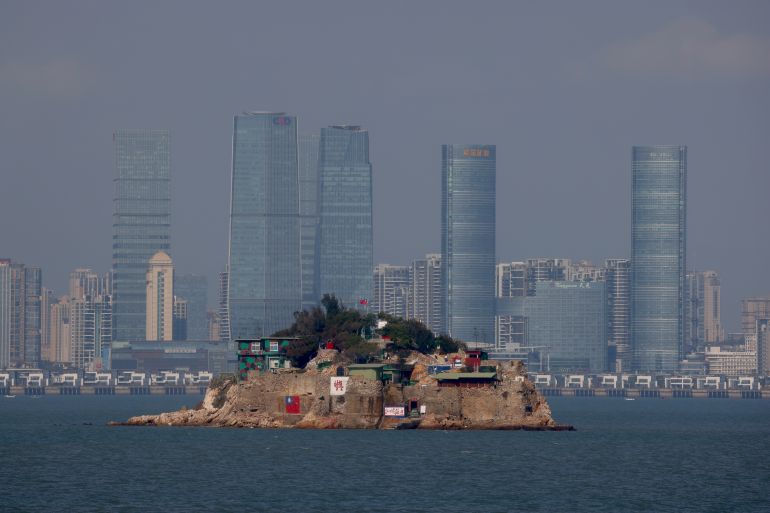Taiwan’s military shoots down first drone over Kinmen island
Move comes after Taiwan said it will use live ammunition to bring down Chinese drones flying over its territory.

Taipei, Taiwan – Taiwan’s military has said it shot down an unidentified civilian drone over the outlying island of Kinmen amid a continuing increase in Chinese military activity around the island since last month’s controversial visit by US House of Representatives Speaker Nancy Pelosi.
The drone, which was shot down on Thursday, is the first to be hit following a warning from Taiwan that it would use live ammunition against drones. The threat came after a video of Taiwanese soldiers throwing rocks at a Chinese drone went viral.
Keep reading
list of 4 itemsUS governor visits Taiwan in trip focused on semiconductors
Biden to ask for approval for $1.1bn arms sale to Taiwan: Report
US warships transit Taiwan Strait in a first since Pelosi’s visit
Drone flights have reportedly escalated near Kinmen, which is located a few kilometres off the coast of China, and around the Matsu Islands in the East China Sea.
The decision to fire on Chinese drones is a departure for Taiwan’s military, said Yen-Chi Hsu, an assistant researcher at Taiwan’s Council on Strategic and Wargaming Studies.
“In the past 30 years, the national army stationed in Kinmen and Matsu has seldom used live ammunition [against aircraft and vessels],” Hsu told Al Jazeera. “Because it is difficult to determine whether or not they are for military use.”
Hsu said the drones could merely be a “civilian adventure”.
Taiwan’s military said China has made use of “civilian aircraft, weather balloons, recreational fishing boats and marine research vessels” against it, according to government media.
Such activities are often described as “grey zone tactics” by analysts, intended to harass and intimidate but fall short of a military provocation. Other “grey zone tactics” include disinformation campaigns and hacking.
China claims Taiwan, which is a self-ruling democracy, as its own territory.
Beijing has pledged to unify Taiwan and China by peace or by force, though a recent Chinese white paper released in August appears to have watered down Beijing’s stated preference for a non-military solution to the question of Taiwan.
That change in stance followed the visit by Pelosi, the highest-ranking US official to visit Taiwan in a quarter of a century.
Beijing had warned against the Pelosi visit and in a sign of its anger, China held several days of live-fire military exercises around Taiwan, including the use of missiles.
While the exercises have ended, China has continued to send large numbers of military aircraft and vessels towards Taiwan daily.
Taiwan’s military said in August that it had tracked nearly 450 Chinese military aircraft incursions into the country’s air defence identification zone so far this year, a figure that nearly doubles last year’s record of 196 during a tense period in October.
China’s military may be conducting internal stress tests with the increased flight incursions while also establishing a “new normal” for Taiwan, said Kitsch Liao Yen-fan, a military and cyber-affairs consultant for the Taiwanese think-tank Doublethink Lab.